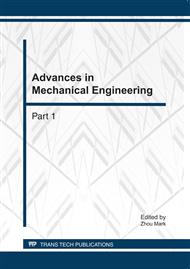[1]
I. Foster, C. Kesselman: The Grid: Blueprint for a New Computing Infrastructure. Second Edition. China Machine Press, Beijing(2005), in press.
Google Scholar
[2]
M. Caramia, S. Giordani: Resource Allocation in Grid Computing: An Economic Model. WSEAS Transactions on Computer Research, Vol. 1, No. 3 (2008), pp.19-27.
Google Scholar
[3]
Liu Yang, Han Kai, Zhang Dexian: Consumer Sharing Policy Constrained Resource Allocation Method for Grid System. The 9th International Symposium on Communications and Information Technology (2009), pp.721-725.
DOI: 10.1109/iscit.2009.5341150
Google Scholar
[4]
G. Engelbrecht, S. Benkner: A Service-oriented Grid Environment With On-demand QoS Support. Proceedings of 2009 IEEE Congress on Services (2009), pp.147-150.
DOI: 10.1109/services-i.2009.84
Google Scholar
[5]
Xiao Peng, Hu Zhigang: A Novel QoS-based Co-allocation Model in Computational Grid. 2008 IEEE Global Telecommunications Conference (2008), pp.1562-1566.
DOI: 10.1109/glocom.2008.ecp.304
Google Scholar
[6]
F. Tao, Y. Hu, D. Zhao: An Approach to Manufacturing Grid Resource Service Scheduling Based on Trust-QoS. International Journal of Computer Integrated Manufacturing, Vol. 22, No. 2 (2009), pp.100-111.
DOI: 10.1080/09511920802139875
Google Scholar
[7]
Yu Yiyu, Tang Junhua, Hao Liming: A Grid Trust Model Based on MADM Theory. 2008 IEEE Global Telecommunications Conference (2008), pp.2133-2137.
DOI: 10.1109/glocom.2008.ecp.411
Google Scholar
[8]
R. Buyya, M. Murshed: GridSim: A Toolkit for the Modeling and Simulation of Distributed Resource Management and Scheduling for Grid Computing. The Journal of Concurrency and Computation: Practice and Experience (2002), pp.3-15.
DOI: 10.1002/cpe.710
Google Scholar
[9]
B. Rajkumar, M. manzur, A. David: Scheduling Parameter Sweep Applications on Global Grids: a Deadline and Budget Constrained Cost-time Optimization Algorithm. Software Practice and Experience, Vol. 35, No. 5 (2005), pp.491-512.
DOI: 10.1002/spe.646
Google Scholar
[10]
Li Chunlin, Li. Layuan: A Multi-QoS Guaranteed Dynamic Grid Resource Scheduling Algorithm. International Journal of Computers and Applications, Vol. 29, No. 3(2007), pp.245-252.
DOI: 10.1080/1206212x.2007.11441854
Google Scholar
[11]
Ding Ding, Luo Siwei, Gao Zhan: A Matrix Scheduling Strategy with Multi-QoS Constraints in Computational Grid. The 5th International Conference on Advances in Grid and Pervasive Computing(2010), pp.59-68.
DOI: 10.1007/978-3-642-13067-0_10
Google Scholar
[12]
Chen Jing, Pan Xun. Grid resource scheduling strategy based on double QOS constraints. Computer Integrated Manufacturing Systems, Vol. 14, No. 8(2008), pp.1571-1578.
Google Scholar


